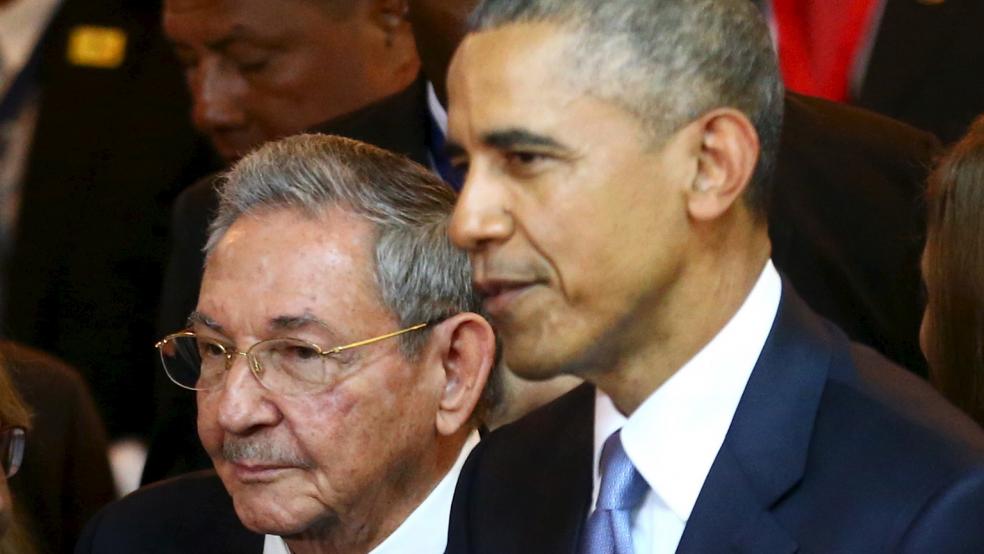As the Cuban Embassy in Washington D.C. reopens on Monday after a 54-year gap, analysts said that easing relations with the U.S. could provide "limited" commercial benefit for the communist nation with tourism and telecoms set to be the biggest beneficiaries.
For the first time since 1961, the two countries will reopen embassies in each other's capital cities, signaling the formal re-establishment of diplomatic relations. This follows surprisingly rapid negotiations this year between U.S. President Barack Obama and Cuban President Raul Casto—the younger brother of revolutionary leader Fidel—that have already seen political prisoners released and travel, trade, and remittance policies adjusted.
However, U.S. sanctions on Cuba remain in place, with most business transactions between the two countries still prohibited and, even though some travel rules have been relaxed, U.S. tourists can still not visit the island.
"Trade and investment between the U.S. and Cuba, which remains the only single-party system in the Western hemisphere, are likely to continue improving and this will drive increased trade and investment between the two countries," Diego Moya-Ocampos, senior Latin American analyst at IHS Country Risk, told CNBC on Friday.
Related: Cuba says not convinced U.S. has given up 'regime change' policy
"Nevertheless most of the sanctions that are still in place due to a U.S. embargo on Cuba will remain there and will constrain some aspects of these improved trade and investment conditions."
Cuba ranks 131st in the the U.S. Central Intelligence Agency's list of the world's richest countries in terms of gross domestic product (GDP) per capita (a measure of the size of a country's economy divided by the number of its inhabitants) . At $10,200, its GDP per capita puts it roughly on a par with its Caribbean neighbor, Jamaica.
The U.S. embargo has cost Cuba around $1.1 trillion, the United Nations said last year, citing the Cuba's foreign minister. For 23 years, the transnational organization has campaigned for the blockade to be lifted.
Moya-Ocampos added that reestablishing relations would allow the U.S. Departments of the Treasury and Commerce to license more economic activity with Cuba, framed as "humanitarian (assistance), as aid and as education."
Related: Cuba by the Numbers: What You Need to Know
Michael Henderson, principal Latin America analyst at Verisk Maplecroft, told CNBC that the commercial impact of the embassies reopening would be "fairly limited," but that nonetheless tourism and telecoms were likely beneficiaries.
"Cuba is already quite a well-established tourist destination. It has the supporting infrastructure in place, so as we see that with more and more Americans circumventing this travel ban that is a sector that could do quite well," he said on Monday.
Regarding the telecoms industry in Cuba, Henderson added: "Levels of penetration are quite low in things like Internet and mobile services, so really, there are some chances there to tap a market that at the moment is still very underdeveloped."
Don't expect 'miracles'
However, the U.S. embargo remains a substantial bar to economic change and is seen remaining in place as long as the Republican Party controls Congress, with some Republican presidential candidates for 2016—notably Marco Rubio and Jeb Bush—vehemently opposed to easing relations.
"I think we need to be careful not to expect miracles to happen too soon," Henderson told CNBC.
Related: 20 American Cars That Rock Cuba
"If one of these anti-Cuba Republicans were to get into the White House from 2016, we could really see a stalling in relations; we could see this process fall apart," he later added.
The rapprochement with Cuba has proved popular internationally, so a Republican president in 2016 could be wary of rolling back on relations. And a further spur could come if 84-year-old Raul Casto steps down as president in 2018 as expected.
"If that is the case, even the skeptical Republicans may see that as an opportunity to drive forward a little bit. But again, that could be slow, so it very much depends in the medium-term on what happens in the (U.S.) election," Stuart Culverhouse, chief economist and head of research at Exotix, told CNBC on Monday.
Meanwhile, Cuba continues to make modest steps away from its hardline Communist stance on economic management, allowing small household businesses to flourish. It has also reopened talks with external creditors about restructuring its debts, some of which have been in default since the 1980s.
"The Cuban government has understood that the Cuban economic and development model is simply not sustainable; that they need to open up their economy; that they need to give more room to the private sector; that they need to encourage more foreign direct investment," Moya-Ocampos told CNBC.
However, economic transformation may not lead to a political change in Cuba, which has been ruled by the Castro brothers as a one-party Communist state since 1959.
"The communist party elite that are in charge of the country, and the security apparatus, which basically guarantees the continuity of the Castro brothers' regime, will be very, very careful that this economic opening is not necessarily accompanied with democratic political reform," Moya-Ocampos said.
This article originally appeared on CNBC.
Read more from CNBC:
3 money musts for 'clueless' millennials: Advisor
Grindr CEO: User data under fire as e-dating grows
Google's most confusing metric




